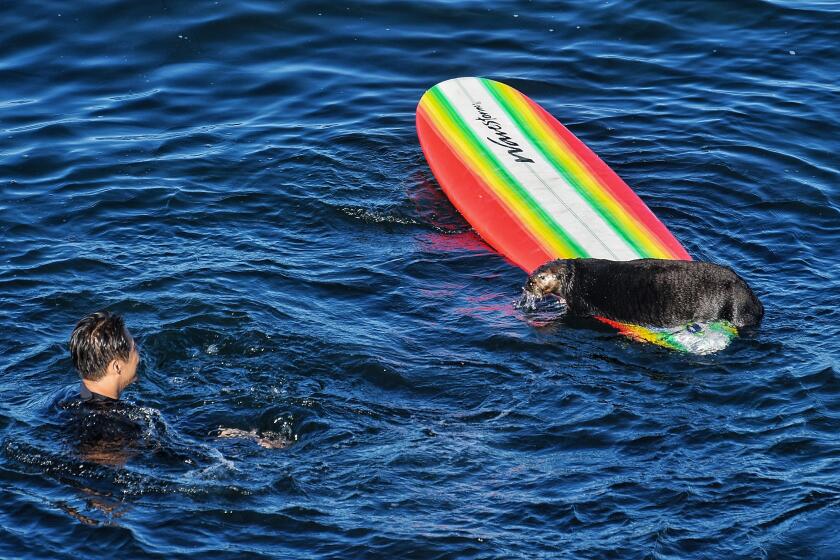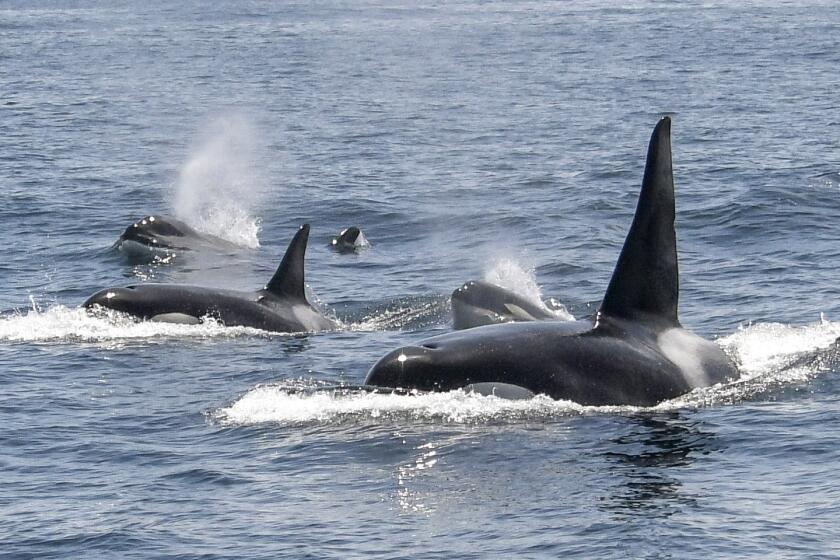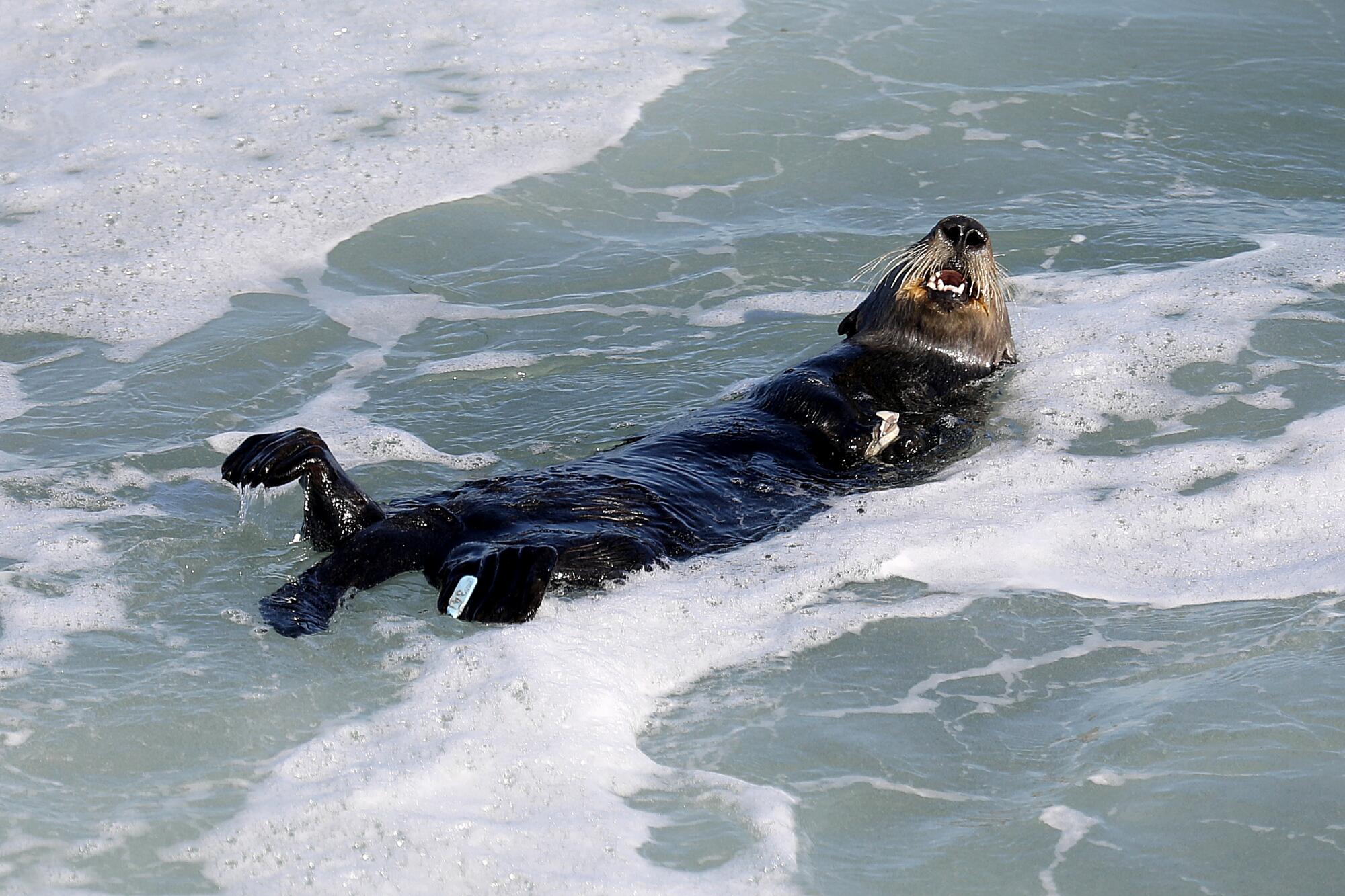
- Share via
SANTA CRUZ — Nobody in this quintessential beach town can say exactly why a sea otter began harassing surfers and stealing their boards a month ago, but officials can tell you that California’s most-wanted sea mammal is definitely refusing to surrender quietly.
With helicopters thudding overhead as she lounges in kelp beds, game wardens in wet suits tracking her as she dives for shellfish and crowds of observers cheering her on from the beach, the renegade otter that authorities call “841” has so far managed to avoid capture.
Officials say the otter needs to be trapped because her unusually bold behavior — which includes gnawing on surfboards — poses a danger to herself and humanity.
Taking her into custody however is proving very difficult, and the spectacle of a land, sea and air dragnet is causing some to wonder if it’s worth the effort. At the same time, some observers speculate that 841’s aggressive behavior may be due to hormonal surges brought on by pregnancy.
An ornery, board-jacking sea otter is terrorizing surfers off the coast of Santa Cruz. An effort is underway to capture the creature.
Since July 13, the U.S. Fish and Wildlife Service — in coordination with California Department of Fish and Wildlife and biologists from the Monterey Bay Aquarium — have tried repeatedly to trap the otter from “both surface and underwater approaches.” Recent attempts have involved a “bait” surfboard and diver, and a nearby boat with a net and box to trap her.
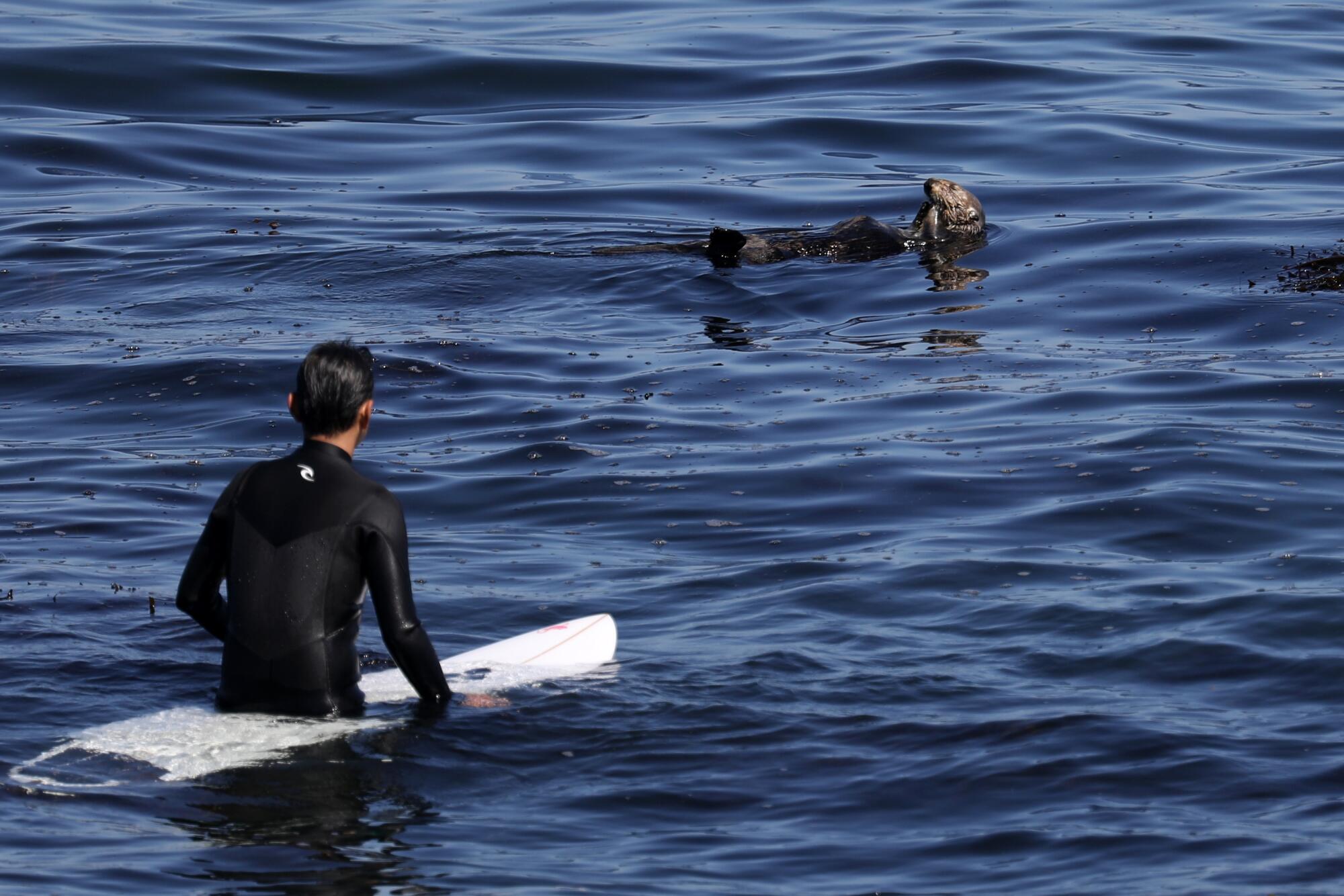
On Monday, a four-person crew took motorboat into the area where she likes to swim, dive for urchins and crabs, and loll in the kelp. From the boat, they sent out an empty surfboard — a bright colored soft top, donated by a victim, according to Mark Woodward, a Santa Cruz social media influencer, who spends his days chronicling the goings-on in this seaside town — as well as a wet-suited swimmer.
Each time they put the board in the water, she’d approach and climb aboard. The swimmer, attached to the board by a leash, would then tow the otter — still on the board — toward the boat.
However, every time she got within about 50 yards of the boat, she’d dive off and swim away, said Woodward.
On Tuesday, a crowd of eight onlookers stopped along a fence, just south of the Santa Cruz lighthouse, and pointed down at the otter. They took photos and said “awwww” as she floated on her back, hitting some sort of shellfish repeatedly against a rock she had lying on her chest.

“This is her home,” said Jessica Beane, 48, of San Bruno. “They should leave her alone and let her be.”
Beane and her friend, John Flores, 45, of San Carlos, had come over the mountains from the Bay Area just to see the otter.
“I had the day off and said, ‘Why not?’” said Beane.
The rebel otter can be identified by a light-blue tag on the webbing of her left foot — a relic from when she was born in captivity.
On most days, 841 can be seen eating, swimming and hunting just off the cliffs between the lighthouse and Cowell Beach, near the boardwalk. Unlike other otters, she hangs close to the cliffs, never more than about 20 to 30 feet offshore.
Surfers navigate around her carefully, and on the five evenings a Times reporter went to observe her, she completely ignored nearby wave riders — most of whom were surfing on hard boards.
Woodward said that although she has taken a chomp out of a few hard boards in the past, she seems to prefer soft, colorful boards.
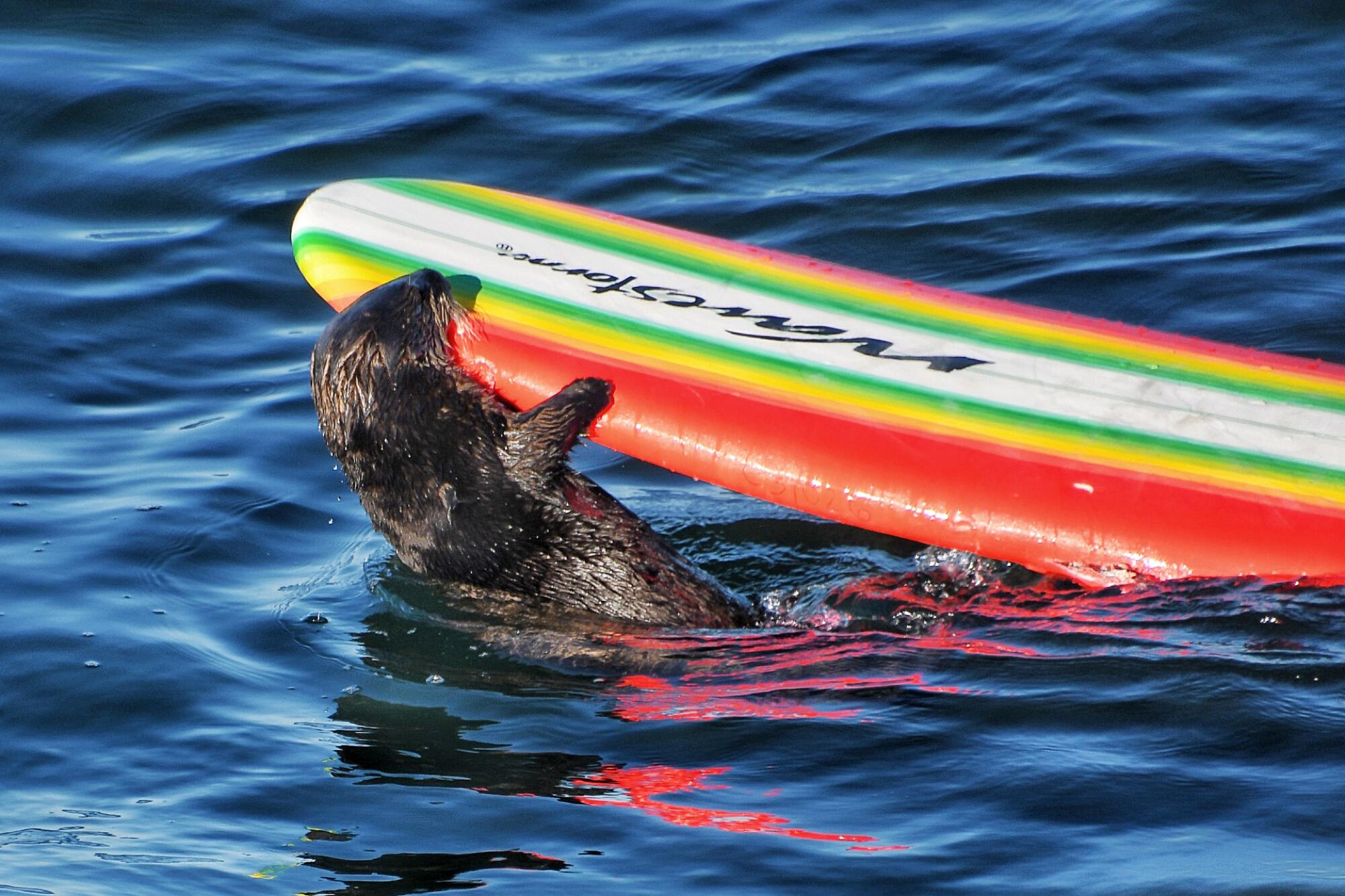
On the evening of July 13, a man on a red-and-white striped prone paddleboard whizzed by as 841 munched on an urchin. Distracted by the boarder, she dropped her food and stretched her head up to get a better look. Curious, she took off after him, but he was too fast and she quickly lost interest.
On Saturday, July 15, officials tried to capture her in front of hundreds of onlookers, many of whom had come to the coast to escape the oppressive inland heat.
According to videos and photos shared on social media, as well as firsthand accounts, Fish and Wildlife agency biologists set up a net that stretched from the wharf 200 yards toward the shore.
Killer whales have reportedly attacked more than 500 boats in European waters recently. Are they exacting revenge for humanity’s treatment of orcas?
Woodward said the crew set out a surfboard and paddleboard and appeared to try and “herd” her over the net.
“She didn’t fall for it,” he said.
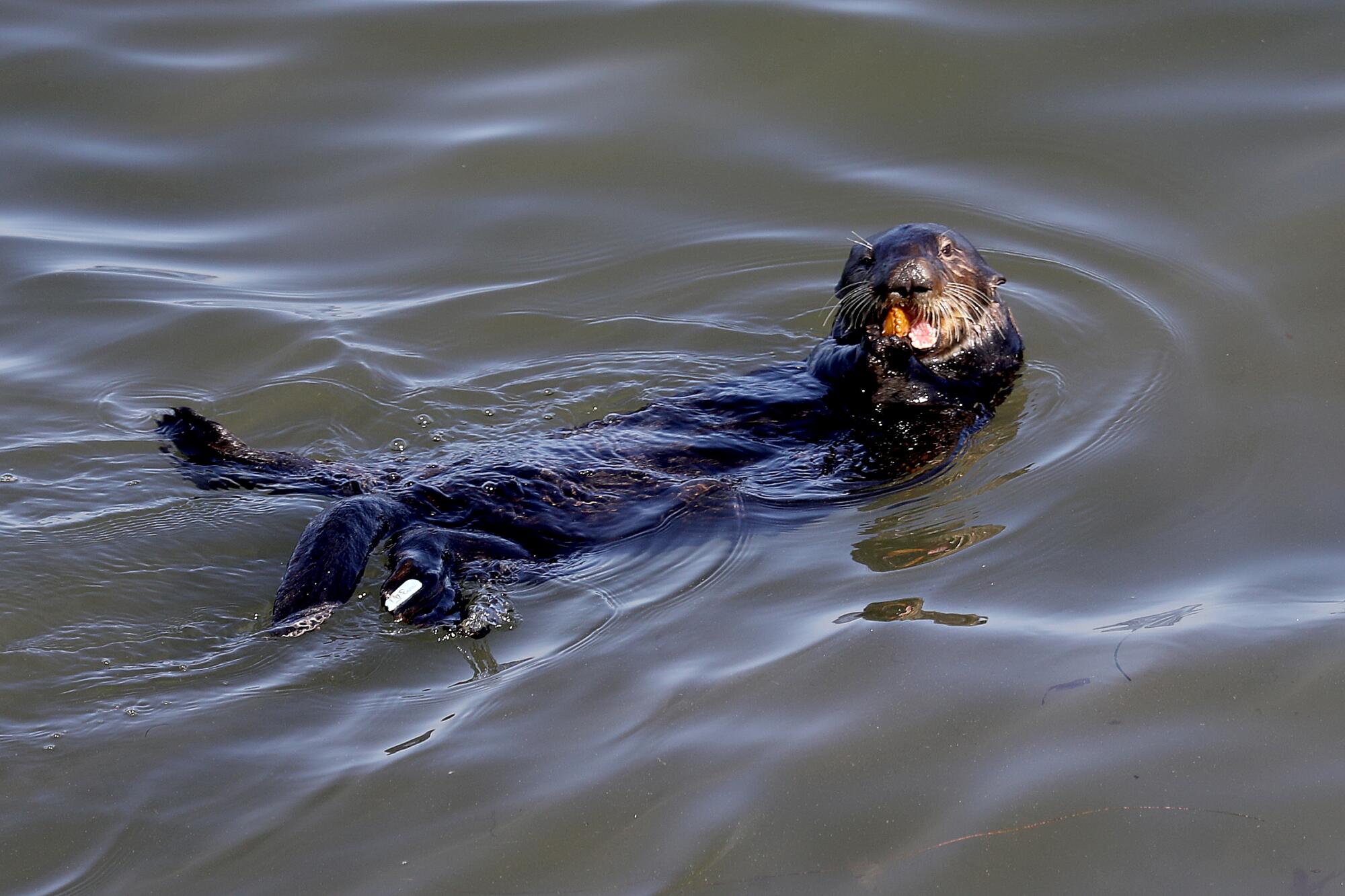
He said he’s worried that all these baiting attempts are going to make her more likely to get into trouble.
“I mean, come on! They give her a board, then tow her around. It’s like they’re asking her to go after surfboards,” he said.
Woodward said two U.S. Coast Guard boats were also on the scene Saturday, while a Coast Guard helicopter circled above.
A spokeswoman for U.S. Fish and Wildlife did not respond to direct inquiries from The Times about the attempt or the potential for making matters worse for the otter.

Ashley McConnell said in a statement that capture “may take days or weeks given logistical considerations, the sea otter’s behavior, and shifting environmental conditions, such as water clarity.”
She said wildlife agencies have decided to remove her from the area because of her “unusual and repeated aggressive behavior approaching people and biting surfboards, and her apparent lack of fear of humans.”
She said such behavior poses a “potential threat to the public and herself.” They note that 841 could incur “a potentially fatal intestinal blockage from consuming styrofoam.”
The story of Tuffy, a baby red-tailed hawk who was kidnapped by a family of bald eagles, has come to a sad end following a failed rescue attempt.
Last week, Dan Marshall, a Santa Cruz resident of 50 years, said he was told by a U.S. Fish and Wildlife biologist that 841’s behavior could be attributable to pregnancy; and if she were to give birth, they’d probably call off the hunt.
“I am praying she gives birth so they just let her be,” he said, looking down at the otter as she munched on a crab in the kelp bed below.
Politicians are weighing in too. Zach Friend, a Santa Cruz County supervisor, texted a Times reporter: “Just FYI. I’m on Team Otter.”
McConnell, the Fish and Wildlife spokeswoman, said it was possible 841 is pregnant.
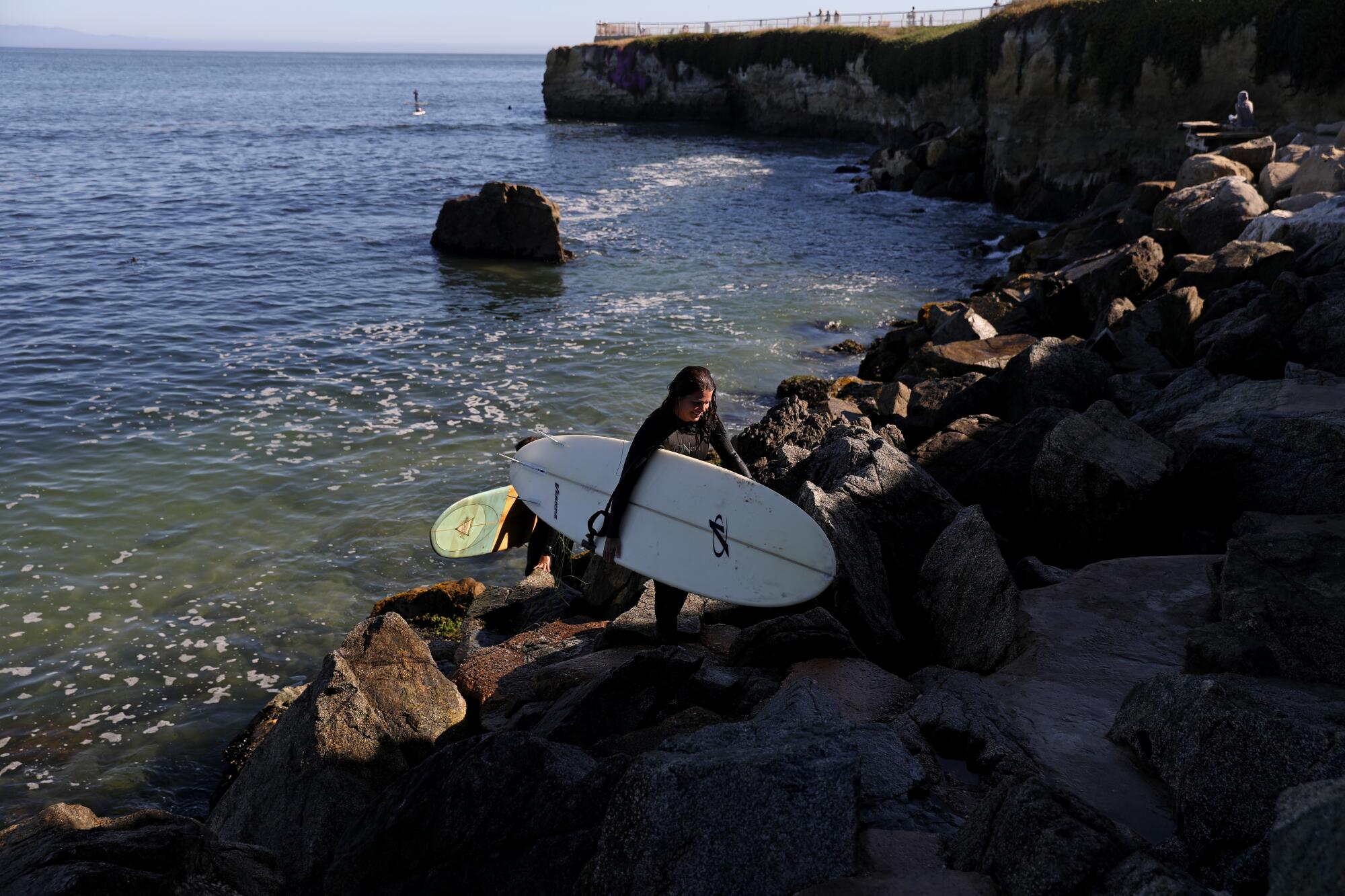
“Hormonal surges related to pregnancy have been known to cause aggressive behavior in female southern sea otters,” she said in a statement.
But they won’t know for sure until they get her in for testing.
McConnell said even if 841 bites someone, they will not euthanize her.
“Teams will continue to attempt safe capture of this sea otter,” said McConnell, “and will coordinate with suitable licensed facilities to provide her with long-term care as an ambassador for her species in a zoo or aquarium.”
More to Read
Sign up for Essential California
The most important California stories and recommendations in your inbox every morning.
You may occasionally receive promotional content from the Los Angeles Times.
